2018 年浙江宁波大学基础英语考研真题
I. Vocabulary (30 points)
This part consists of two sections.
Section A
Directions: Choose one of the four alternatives which is closest in meaning to the
underlined word or phrase and mark the corresponding letter. Please write your
answers on the Answer Sheet.(1×20 points).
1.The
intellect
is
always
held
in
abeyance
bythe
spirit
of
reasonable
ness,
and
still more by the
writer's
artistic
sensibility.
A
. suspension
B.
approval
C. continuation
D. antidote
2. She smiled the
credulous
smile of ignorant innocence and pulled the gate open.
A. sophisticated
B. naive
C.
deceiving
D.
guilty
3.We can
trace
the
rudimentary
roots
of
all
our
values
and
limits
b
ack
in
our childhood
anecdotes.
A. salient
B. deep
C. fundamental D.
far-fetched
4. Alexander
envisioned
a
cosmopolitan
culture
in
his
new empire.
A.
local
B.
endemic
C. provincial
D. universal
5.Perhaps
the
first
thing
any
cynic
will
note
about
these
pledges
is
that
they are
devoid
of
any
self-sacrifice.
A. realist
B. faultfinder
C.
optimist
D.
pessimist
6.When
the
winds
blew
through
the
holes,
the
rocks
emitted
an
eerie
keening
sound,
like
a
dirge
of
lost
souls.
A. elegy
B.
song
C. eulogy
D. tribute
7.I
am
blessed
with
a
buoyant
temperament
and
enjoy
the
pleasures
of
this
earth.
A. lighthearted
B. depressed
C.
disheartened
D. glad
8.
He
saw
the hideous,
obscure
shape
rise slowly
to
the
surface.
A. beautiful
B.
unclear
C.
repulsive
D.
ambiguous
9.Jim
likes
to
gloat
over
all
the
sports
prizes
he
has
own,
which
he
keeps
in
a
glass
case.
�
A.
revel
B. lament
C. survey
10.It
would
be
unwise
to
pretend
that
D.
it
scan
does
not
happen
and
dishon
est
to
disavow it
in
any circumstances.
A. claim
B.
renounce
C.
confess
D.
plead
11. His
rubicund
face
expressed
consternation
and
fatigue.
A. rough
B. robust
C. ruddy
D. dark
12.Going
higher-end
also
means
Microsoft
would
dodge
a
potential
threa
t to
Amazonand
Google.
A. duck
B.
form C. propose D.
profile
13 . Laughter
is
the
tonic,
the
relief, the
surcease
for pain.
A . exhaustion
B. regulator
C. monitor
D.
refresher
14.When
my
play
was
with
thee
I
never
questioned
who
thou
wert.
I
knew nor
shyness
nor
fear,
my
life was
boisterous
A. controllable
B.
disorderly
C. wild
D. unruly
15.He
had
plenty
of
feedback
and
plenty
of
time
to
mitigate
this
is
sue, but
he
can
be
stubborn.
A . alleviate
B. shorten
C.
increase
D.
revise
16.The
eggs
are
packed
in
cartons
lined
with
shockproof
corrugated
paperboard.
A. smooth
B. horizontal
C. silky
D. ribbed
17.In
the
East
he
succeeded
in
establishing
Byzantine
hegemony
over
t
he
crusading
states.
A.
overthrow
B.
conquest
C. supremacy
D. subjugation
18.Art
is
the
stored
honey
of
the
human
soul,
gathered
on
wings
of
misery
and
travail.
A.
labour
B. journey C. pilgrimage
D. wretchedness
19.He
who
will
not
reason,
is
a
bigot;
he
who
cannot
is
a
fool;
a
nd
he
who
dares
not
is
a
slave.
A. cynic
B.
pessimist
C. dogmatist
D . fascist
20.Out
of
the
corner
of
my
eye
I
saw
a
blur
of
movement
on
the
o
ther sideof
the
glass
�
A.
clarity
B. haziness
C. shape
D.
transparency
Section B
There are ten words or phrases underlined in the following sentences. You are
required to use other English words or phrases to explain them with the meanings
that best suit those sentences (1×10 points).
For example: Johnny Carson has much to do to keep up with great eloquence
Answer:
quick and witty tongue.
1.
While
his
intentions
are
to
save
lived
and
prevent
injuries,
this
manger
is
perceived
as
vindictive,
uncaring
and
self-serving.
2.
sh
3.
4.
It
is
not
to
shame
you
that I
write
these
things
but
to
admoni
you
as
my
beloved children.
All
the people
in
the
party
were
disgusted
with
his bawdy
jokes.
His
aesthetic
and
ideology
have
seeped
into
the
very
fabric
of
A
merican
theater.
5.
This
magnifies
US
cultural
advantages
because
the
market
into
whic
h artists
from
other
countries
must
sell
is
often
abysmal.
6.
Violent
storms
wreaked
havoc
on
the
French
Riviera,
leaving
three
people
dead and
dozens
injured.
7.I
seemed
to
discern
some
signs
of
emotion
upon
the
butler's
whitef
ace.
8. Critics
of
the
scheme
take
a
less
benign
view.
9.The
crux
of
the
matter
is
not
shortage
of
time,
but
shortage
of
work.
10.He
speaks
many
languages
including
Arabic,
so
he
was
assigned
to
dangerous
covert
operations.
II. Cloze (20 points)
Directions: There are twenty blanks in the following passage. You are required to
fill the words or phrases in them that best complete the passage to make a smooth
and logical reading semantically, syntactically and textually. The words that you
use to fill in the blanks can be any that you think are suitable and able to make
the passage smooth in meaning and grammar. Please write your answers on the Answer
Sheet. (1x20 points)
�
Shakespeare’s sonnets are very different from Shakespeare’s plays, but they do
contain _____1_____elements and an overall sense of story. Each of the
poems__2____with a highly personal theme, and each can be __3___ on its own or in
relation to the poems around it. The sonnets have the feel of ___4___ poems, but
we don’t know whether they deal with real events or not, because no one knows ___5___
about Shakespeare’s life to say whether or not they deal with real events and
feelings, so we tend to refer to the voice of the sonnets as “the speaker”—as
___6___ he were a dramatic creation like Hamlet or King Lear. There are certainly
a number of intriguing ____7__ throughout the poems. The first 126 of the sonnets
seem to be ___8___ to an unnamed young nobleman, whom the speaker loves very much;
the rest of the poems (except for the last two, which seem generally unconnected
to the __9___
of the sequence) seem to be addressed to a mysterious __10___ , whom
the speaker loves, hates, and lusts for simultaneously. The two addressees of the
sonnets are usually__11___ to as the “young man” and the “dark lady”; in
summaries of individual poems, I have also called the young man the “beloved” and
the dark lady the “lover,” especially in cases where their ____12__ can only be
surmised. Within the two mini-sequences, there are a ____13___ of other discernible
elements of “plot”: the speaker _ 14__ the young man to have children; he is forced
to __15__ a separation from him; he competes with a__16___ poet for the young man’s
patronage and affection. At two points in the sequence, it seems that the young man
and the___17__lady are actually lovers themselves—a state of affairs with which
the speaker is none too ___18___ . But while these continuities give the poems a
�
narrative flow and a helpful frame of reference, they have been frustratingly_19____
for scholars and biographers to pin __20___ . In Shakespeare’s life, who were the
young man and the dark lady?
Prose by its very nature is longer than verse, and the virtues
peculiar with it manifest themselves gradually. If the
cardinal
virtue of poetry is love, the cardinal virtue of prose is just;
and, whereas love makes you act and speak in the spur of the
moment,
justice needs inquiry, patient and a control even
of the noblest passions. To justice, here I do not mean justice
of ideas, but a habit of justice in all processes of thought,
the style
only to particular people tranquillized and a form moulded to
that habit. The master of prose is not cold, and he will not
1
2
3
4
5
6
7
8
9
let
any word or image inflame him with a heat irrelevant with his
10
reject all beauties that are not germane to it; making his own
11
beauty out of the purpose. Unhasting, unresting, he pursues
12
them,
subduing all the riches of his mind on it, very accomplishment
13
of it.
out of the whole work
and its proportions, so as you must read
to the end before you know that it is beauty. But he has his
reward,
for his is trusted and convinces, as those that are at the mercy
of their
own eloquence do not; and he gives a pleasure all the greater
for be
hardly noticed. In the best prose, whether narrative and
argument,
14
15
16
17
18
we are so led on as we read, that we do not stop to applauding
19
�
the
writer, or do we stop to question him.
20
IV. Reading Comprehension (30 points)
Directions: There are three sections in this item with a passage in each section.
Section A requires you to read a passage and provide a brief answer to each of the
given questions. Section B requires you to read and judge whether the relevant
statements are true or false. Section C requires you to read and then write a summary
of it. Remember to write your answers on the Answer Sheet.
Section A. (10 points)
Why the inductive and mathematical sciences, after their first rapid development
at the culmination of Greek civilization, advanced so slowly for two thousand
years—and why in the following two hundred years a knowledge of natural and
mathematical science has accumulated, which so vastly exceeds all that was
previously known that these sciences may be justly regarded as the products of our
own times—are questions which have interested the modern philosopher not less than
the objects with which these sciences are more immediately conversant. Was it the
employment of a new method of research, or in the exercise of greater virtue in the
use of the old methods, that this singular modern phenomenon had its origin? Was
the long period one of arrested development, and is the modern era one of normal
growth? Or should we ascribe the characteristics of both periods to so-called
historical accidents—to the influence of conjunctions in circumstances of which
no explanation is possible, save in the omnipotence and wisdom of a guiding
Providence?
The explanation which has become commonplace, that the ancients employed
deduction chiefly in their scientific inquiries, while the moderns employ induction,
proves to be too narrow, and fails upon close examination to point with sufficient
distinctness the contrast that is evident between ancient and modern scientific
doctrines and inquiries. For all knowledge is founded on observation, and proceeds
�
from this by analysis, by synthesis and analysis, by induction and deduction, and
if possible by verification, or by new appeals to observation under the guidance
of
deduction—by steps which are indeed correlative parts of one method; and the ancient
sciences afford examples of every one of these methods, or parts of one method, which
have been generalized from the examples of science.
A failure to employ or to employ adequately any one of these partial methods, an
imperfection in the arts and resources of observation and experiment, carelessness
in observation, neglect of relevant facts, by appeal to experiment and
observation—these are the faults which cause all failures to ascertain truth,
whether among the ancients or the moderns; but this statement does not explain why
the modern is possessed of a greater virtue, and by what means he attained his
superiority. Much less does it explain the sudden growth of science in recent
times.
The attempt to discover the explanation of this phenomenon in the antithesis
of “facts” and “theories” or “facts” and “ideas”—in the neglect among the
ancients of the former, and their too exclusive attention to the latter—proves also
to be too narrow, as well as open to the charge of vagueness. For in the first place,
the antithesis is not complete. Facts and theories are not coordinate species.
Theories, if true, are facts—a particular class of facts indeed, generally
complex, and if a logical connection subsists between their constituents, have all
the positive attributes of theories.
Nevertheless, this distinction, however inadequate it may be to explain the
source of true method in science, is well founded, and connotes an important
character in true method. A fact is a proposition of simple. A theory, on the other
hand, if true has all the characteristics of a fact, except that its verification
is possible only by indirect, remote, and difficult means. To convert theories into
facts is to add simple verification, and the theory thus acquires the full
characteristics of a fact.
1. The title that best expresses the ideas of this passage is
�
[A]. Philosophy of mathematics.
[B]. The Recent Growth in Science.
[C]. The Verification of Facts.
[D]. Methods of Scientific Inquiry.
2. According to the author, one possible reason for the growth of science during
the days of the ancient Greeks and in modern times is
[A]. the similarity between the two periods.
[B]. that it was an act of God.
[C]. that both tried to develop the inductive method.
[D]. due to the decline of the deductive method.
3. The difference between “fact” and “theory”
[A]. is that the latter needs confirmation.
[B]. rests on the simplicity of the former.
[C]. is the difference between the modern scientists and the ancient Greeks.
[D]. helps us to understand the deductive method.
4. According to the author, mathematics is
[A]. an inductive science.
[B]. in need of simple verification.
[C]. a deductive science.
[D]. based on fact and theory.
5. The statement “Theories are facts” may be called.
[A]. a metaphor.
[B]. a paradox.
[C]. an appraisal of the inductive and deductive methods.
[D]. a pun.
Section B. (10 points)
What we know of prenatal development makes all this attempt made by a mother
to mold the character of her unborn child by studying poetry, art, or mathematics
during pregnancy seem utterly impossible. How could such extremely complex
�
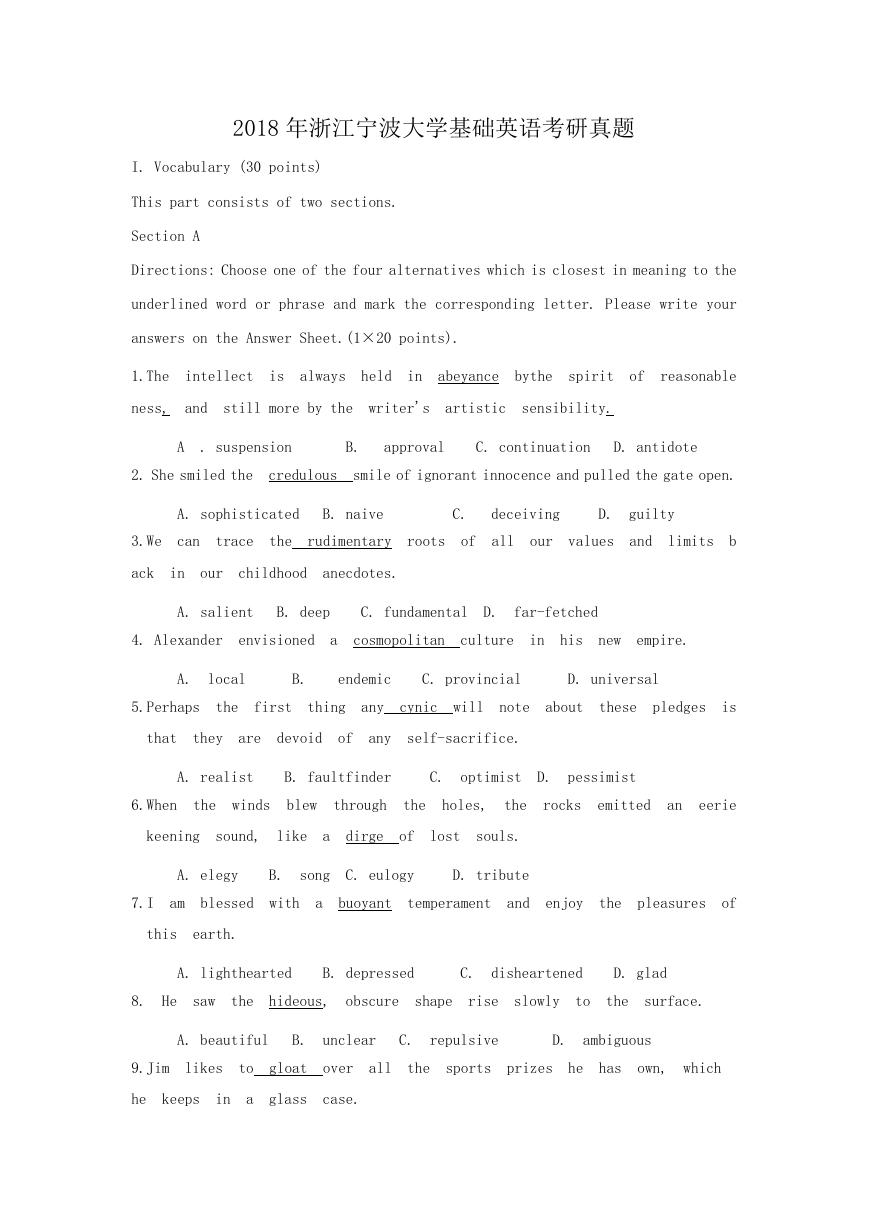
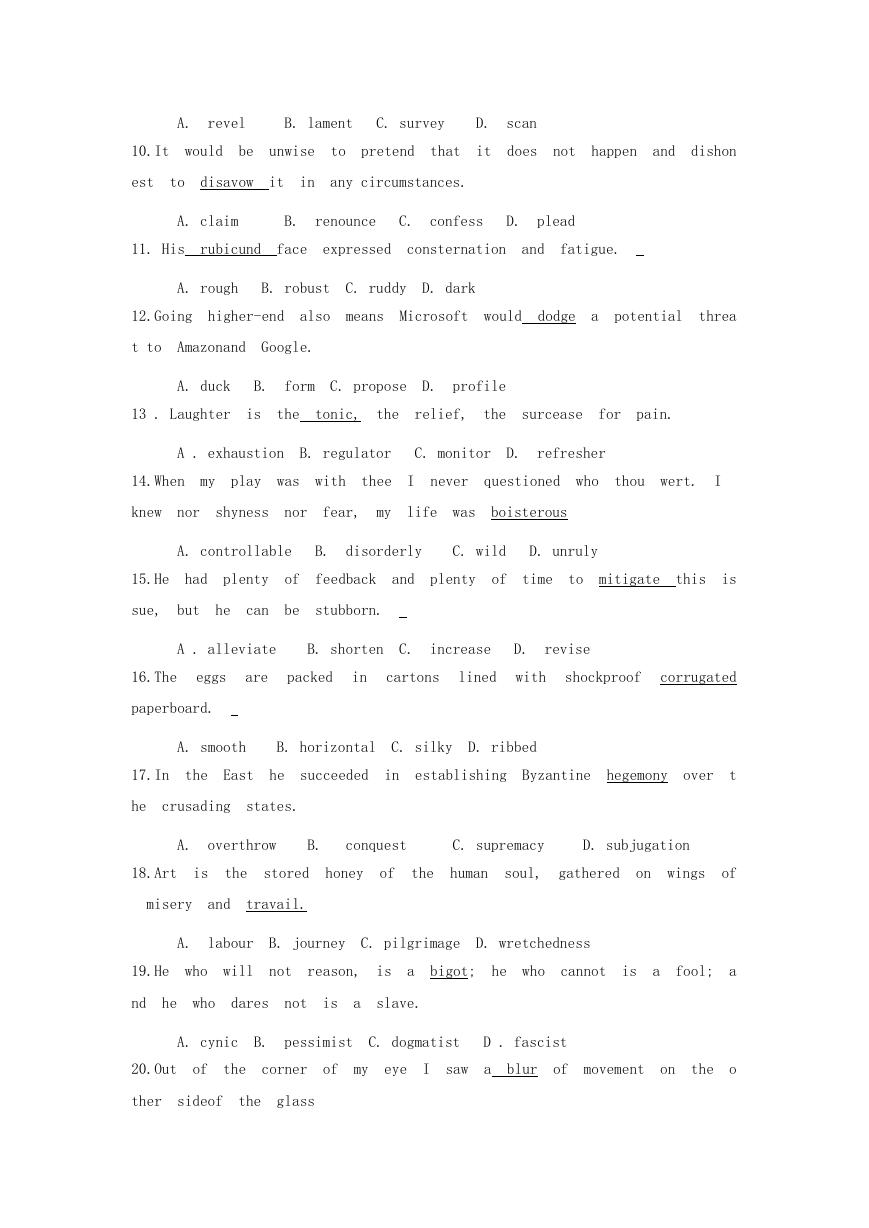

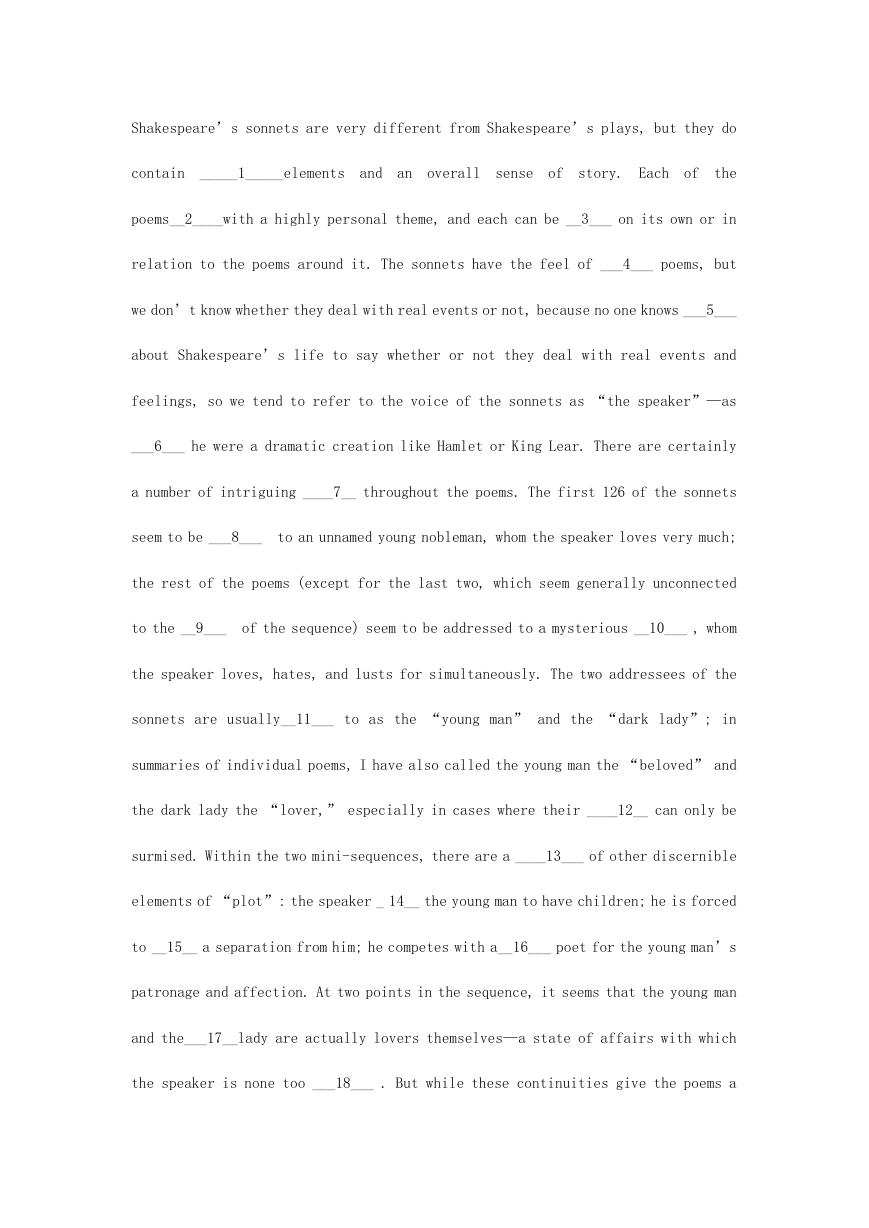
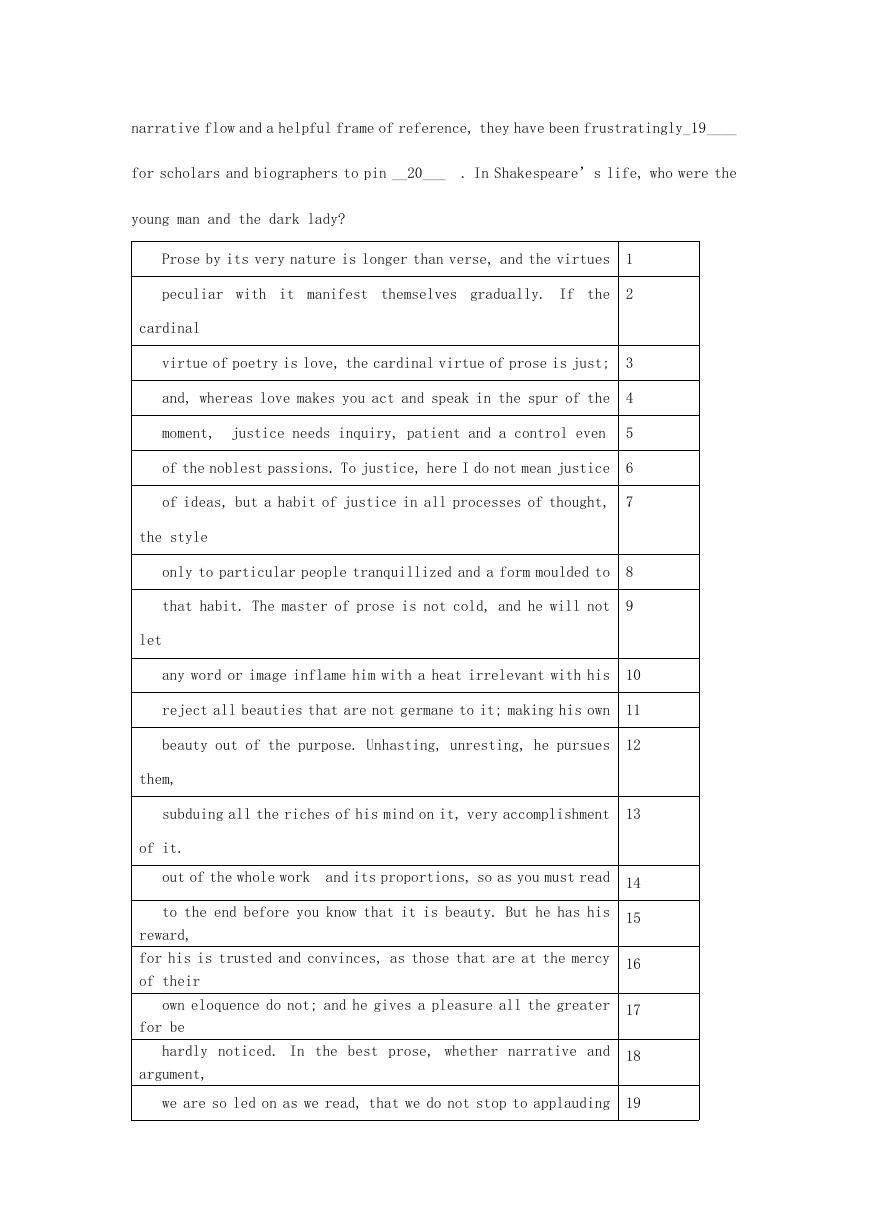
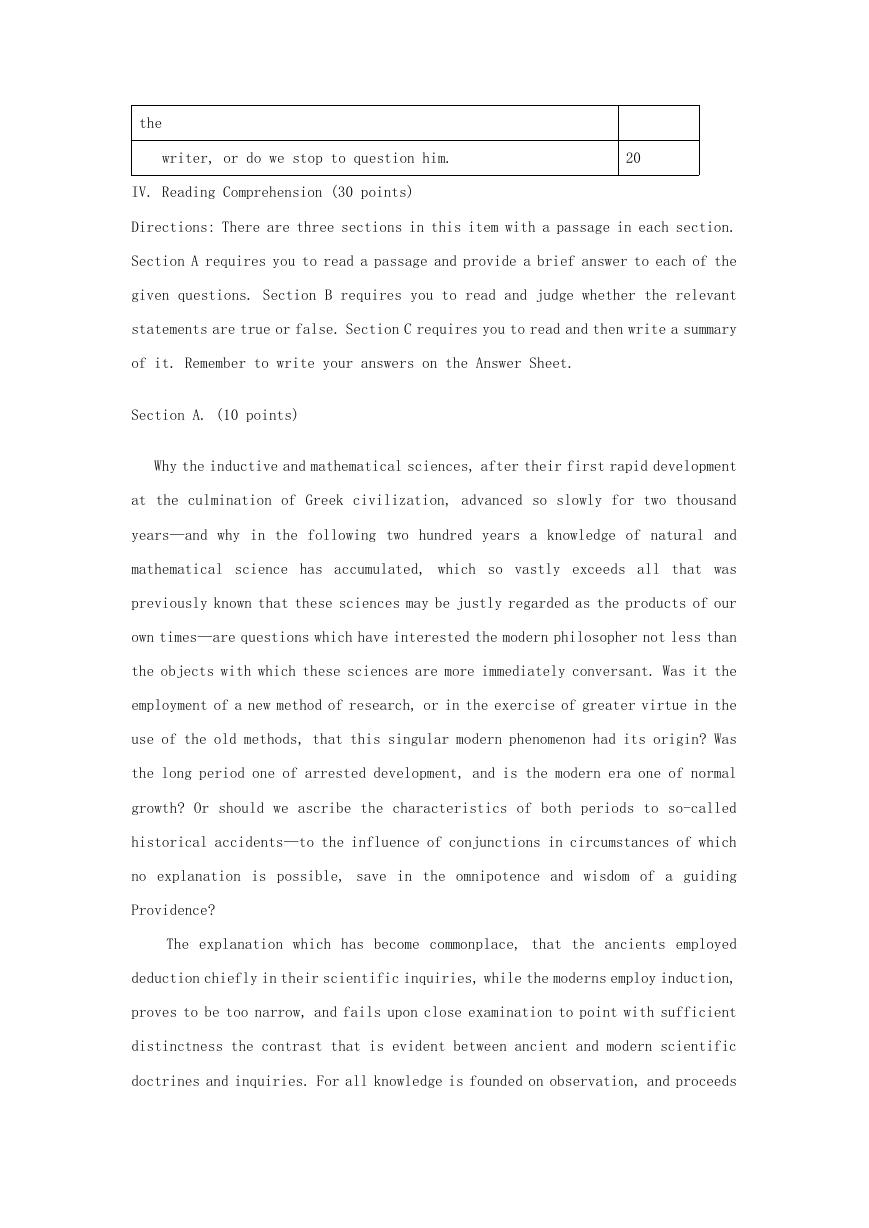
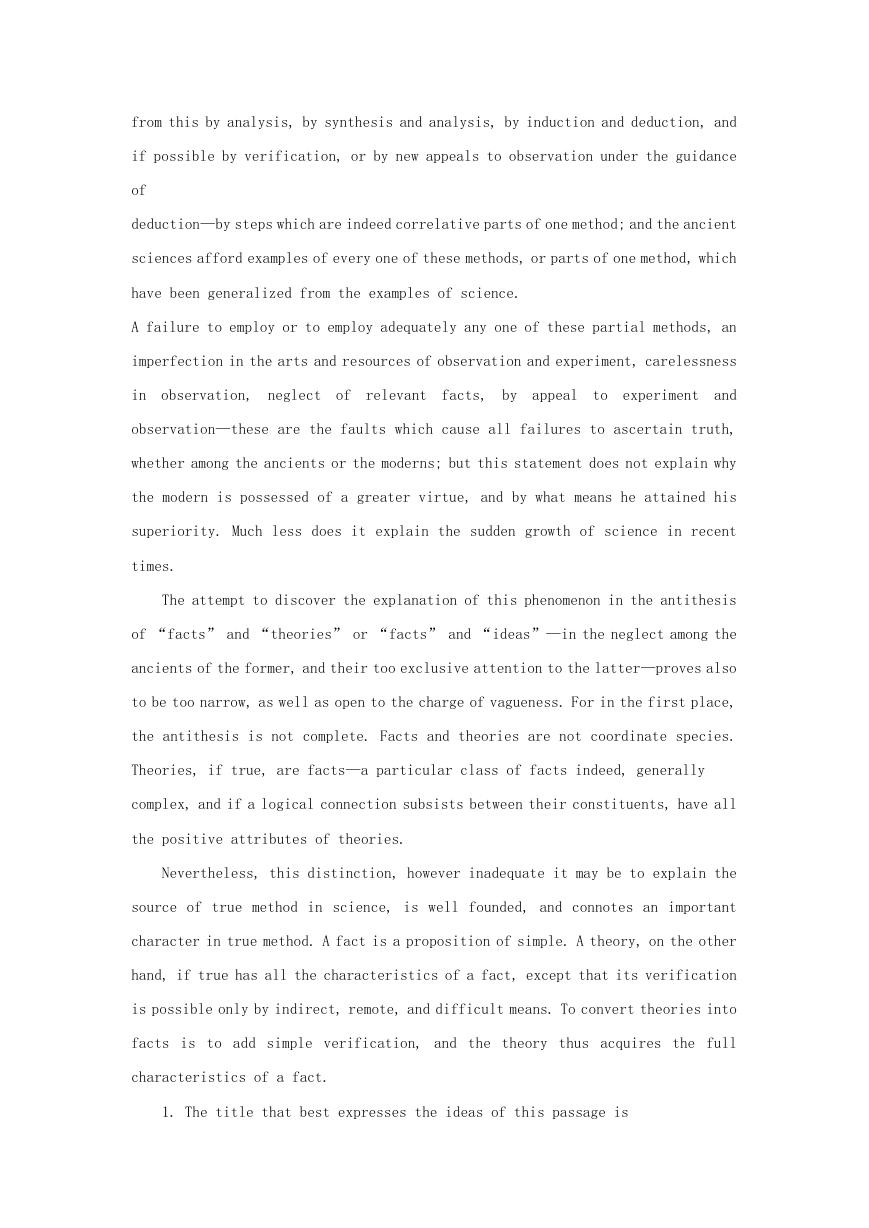
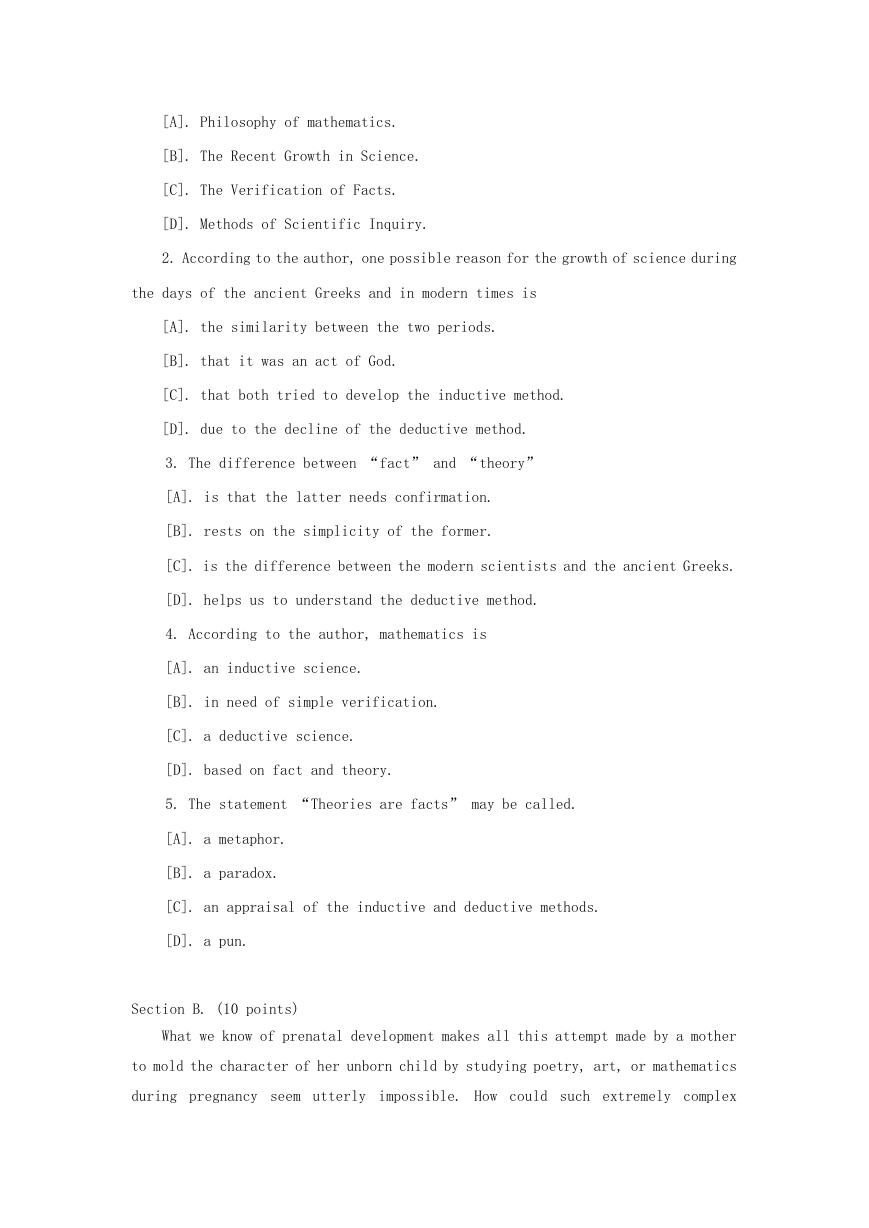








 2023年江西萍乡中考道德与法治真题及答案.doc
2023年江西萍乡中考道德与法治真题及答案.doc 2012年重庆南川中考生物真题及答案.doc
2012年重庆南川中考生物真题及答案.doc 2013年江西师范大学地理学综合及文艺理论基础考研真题.doc
2013年江西师范大学地理学综合及文艺理论基础考研真题.doc 2020年四川甘孜小升初语文真题及答案I卷.doc
2020年四川甘孜小升初语文真题及答案I卷.doc 2020年注册岩土工程师专业基础考试真题及答案.doc
2020年注册岩土工程师专业基础考试真题及答案.doc 2023-2024学年福建省厦门市九年级上学期数学月考试题及答案.doc
2023-2024学年福建省厦门市九年级上学期数学月考试题及答案.doc 2021-2022学年辽宁省沈阳市大东区九年级上学期语文期末试题及答案.doc
2021-2022学年辽宁省沈阳市大东区九年级上学期语文期末试题及答案.doc 2022-2023学年北京东城区初三第一学期物理期末试卷及答案.doc
2022-2023学年北京东城区初三第一学期物理期末试卷及答案.doc 2018上半年江西教师资格初中地理学科知识与教学能力真题及答案.doc
2018上半年江西教师资格初中地理学科知识与教学能力真题及答案.doc 2012年河北国家公务员申论考试真题及答案-省级.doc
2012年河北国家公务员申论考试真题及答案-省级.doc 2020-2021学年江苏省扬州市江都区邵樊片九年级上学期数学第一次质量检测试题及答案.doc
2020-2021学年江苏省扬州市江都区邵樊片九年级上学期数学第一次质量检测试题及答案.doc 2022下半年黑龙江教师资格证中学综合素质真题及答案.doc
2022下半年黑龙江教师资格证中学综合素质真题及答案.doc